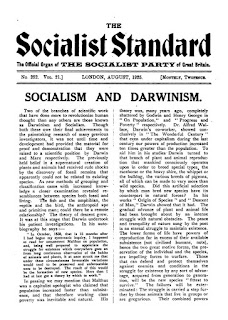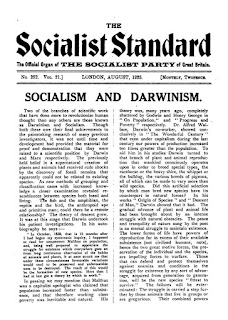(Continued from last month).
The workers demand the franchise.
But the revolt of the workers though it could be repressed could not be destroyed. In spite of all opposition their Trade Unions, though declared illegal by the Combination Acts, persisted and waged a never-ceasing war of resistance against low wages, the extension of the working day and intolerable conditions of labour.
Side by side with the industrial struggle went on a ferment of political ideas at length issuing in demands that were the outcome of the antagonism between the social relations of capitalist economy— fostering ideas of “equal rights” and “individual liberty”—and the actual oligarchic form of the state with its assumption of unequal rights and of different grades of social status.
At first the workers’ aspirations for political and legal rights were inarticulate and unorganised, but the spread of workers’ associations, of discussion and reading and the growing ease of communication facilitated the growth of an organised movement. Political groups aiming at constitutional reform sprang up in the cities and these, though dominated by intellectuals and bourgeois radicals had considerable influence amongst sections of the working class. One of the earliest was the London Corresponding Society, founded in 1797 by Hardy, a bootmaker. With it Paine and Godwin were associated. Its leaders nearly all suffered imprisonment or transportation. At a later date Cobbett carried on a vigorous agitation amongst the workers :
“When he reduced ‘The Weekly Political Register’ from a shilling and a halfpenny to twopence, 50,000 copies were scattered over the country, and everywhere men gathered in clubs to hear the paper read by one of them who had schooling” (Green’s “Short History,” p. 846).
But the great political movement of the period was that of the industrial bourgeoisie. Their struggle for the Reform Bill was undoubtedly instrumental in rallying masses of the workers. But the political demands of the working men had roots independent from and antagonistic to the basis of the bourgeois movement. To them electoral reform was primarily a means of alleviating their economic miseries. At the same time it is impossible to separate, in the stimulus behind their demands, the economic discontent that was the chief spur to action, from the force of the political ideas which gave their discontent expression in aspirations towards political democracy and demands which spoke eloquently of the extent to which they had moved from their old confirmed belief in the necessity of “status” and the inevitability of political privilege.
The details of the Reform Movement need not detain us, but it was a severe and a bloody struggle in which the workers bore the brunt of the fight. After forming the backbone of the struggle for the Reform Bill of 1832 which enfranchised the new capitalists but excluded themselves, the exasperated workers threw their strength into their own Chartist movement and carried on the conflict afresh. Again we may note that, though the Chartist working men meant political reform as a means to economic ends, the purely political demands of the Charter—manhood-suffrage, vote by ballot, etc.—indicate how widespread “democratic” and “libertarian” ideas had become.
Though the Chartist movement broke down and its demands were resisted, the concepts that it had done so much to popularise were now permanently rooted and could not be eradicated. But for a period the agitation for political reform died down. After the worst excesses of the factory-system had been alleviated by the Factory Acts, after a period of comparative prosperity due to the rapid extension of British production and its supremacy in the World Market and to the rising strength of their Unions, the workers had become reconciled to the system. Their Trades Unions, now tacitly recognised by the masters, became benefit societies and means of diplomatic negotiations with the employers. Their leaders declared the common interests of Capital and Labour, and counselled conciliation and mutual good-will between the classes.
But in the “sixties” events revealed the legal insecurity of the Unions and their funds, and a strong demand ensued for their definite legalisation. Along with this movement began an active revival of the agitation for the franchise. Reform Leagues sprang up spontaneously all over the country. The “International,” founded in 1864 and led by Marx, actively supported the new movement.
“All through the autumn and winter (1866-7) great meetings were held in the great towns and cities to promote the cause of reform. A most significant feature of these demonstrations was the part taken by the organised trades associations of working men.” (McCarthy— “Our Own Times.”)
At length, as Engels says, “the workers’ claims to the franchise gradually became irresistible,” and the ruling class gave way.
Significantly enough, it was the Tories who passed the second Reform Bill of 1867, which enfranchised a great mass of the town workers, thus demonstrating that even the most traditionally, cautious party of the master class had seen “the writing on the wall,” and were convinced that working-class suffrage was inevitable. In 1872 the secret ballot was instituted, and in 1885 the vote was further extended to the counties and the agricultural workers.
The ruling-class had made in 1867 what Lord Derby called a “leap in the dark,” but, to their relief—though this must have been half-expected — the plunge proved harmless. It was soon overwhelmingly apparent that the working-class — though jealous enough in the defence of their immediate interests—had no thoughts of disrespect to or revolt from the “rights of property,” and that they believed and acted on the assumption that “capital” and “wages” were eternal categories, and the only practical basis of social life.
Before this, in America and in France, the workers had already achieved the franchise, and since then all over the capitalist world an enfranchised working-class has been recognised as the indispensable basis of stability in the State.
The Great Illusion.
With the vote, with his Unions legalised (1871 in England) and other legal rights established, the workers seemed to have achieved what bourgeois historians regard the be-all and end-all of social evolution—full “civic rights and liberties.” They had in actuality reached the very fullest “freedom” as a class that they could achieve or even conceive so long as their ideas and aspirations kept within the bounds of the capitalist system. The facts of law and politics now no longer seemed in contradiction with the “liberty” and “individualism” of economic life. Did not the “people” now “rule the country,” did not they decide the fate of statesmen and governments, did not the politician plead and struggle for their support and tremble at their indecision? At last, the son of toil seemed truly a free man, and he could sing “Britons never, never, never !” with never a twinge of conscience.
That the overworked, ill-fed slave of the factory-blast can live in the same city with the gilded drones who live in luxurious leisure upon the product of his toil— and yet believe in the reality of his freedom— in liberty of contract and the reward of enterprise seems a ghastly joke. Yet the positive reality of the belief is a fact to which anyone who knows the workers can testify.
The wage-slave does not perceive that the unequal distribution of property into which he is born exercises as compelling a tyrannical control over his destiny as any law that the State can make. He is blind to the fact that freedom for property means slavery for those who possess none. He explains the inequality of wealth op the theory that the rich have been “lucky” or particularly clever. The man who has “got on” he admires, and he lives in the shadowy hope of following in his steps. His hero is the “self-made man.”
It is essential to clearly understand that the resignation of the average worker to the capitalist system and, indeed, his active support of it arises directly from the fact that he accepts private property in the means of life without question. Once this basis is granted, the support of the whole system follows of necessity. The worker may and does desire economic security, but this only results from control of the means of life. In the early, days of the system the workers did endeavour to return to the measure of such control that the hand-tool period allowed them. They fought the machines and tried to turn back the wheels of history. But with the generations that had grown up amongst and known nothing other than the machine system, such aspirations could have no place. The means of production were now giant mechanisms jointly operated —no one worker used them. So long as the traditions of individual ownership persisted, therefore, the workers could not own or even with sense think of owning the instruments they operated. The social productive mechanisms of modern society can only be owned by the users in common —and the idea of social ownership had not yet taken wide and deep root.
But the impossibility of security for the workers did not prevent them continuing to seek for it—but as they accepted the system they had also to accept the only method of aiming at security that the system offers — increase of income, through collective bargaining largely, but also through—if only as a vague but persistent aspiration—”getting on,” if possible, accumulating property—processes that naturally foster the outlook of individualism.
R. W. Housley






